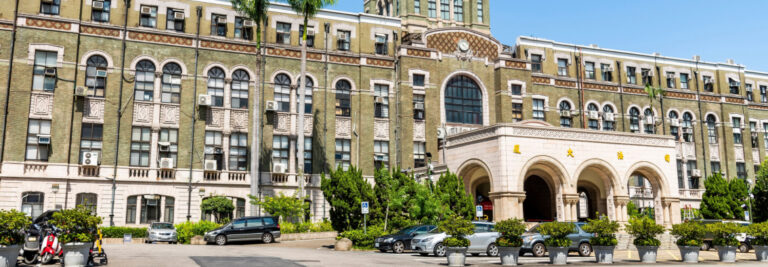On September 16 and 20, the governments of the Solomon Islands and Kiribati in the Pacific Islands announced their decisions to terminate diplomatic ties with the Republic of China (ROC, Taiwan) and establish ties with the People’s Republic of China (PRC), respectively. The announcement marked further advances in Beijing’s years-long effort to squeeze Taipei. Honiara’s announcement coming on the day that Vice Foreign Minister Hsu Szu-Chien (徐斯儉) arrived in the capital in a last-ditch effort to save the relationship, the switch once again shows Beijing to not only be malicious in pressuring Taipei, but petty as well. Even so, the Solomon Islands’ and Kiribati’s decisions are not cause for panic. To be sure, there are reasons for concern, especially for long-term stability in the Taiwan Strait, but there may be a silver lining here as well.
The Good
The loss of two diplomatic allies in quick succession is certainly not a positive development for Taiwan, but the news is not all bad. Honiara’s and South Tarawa’s decisions once again revealed the strength of the support for Taiwan on Capitol Hill. On the day the news broke, 15 members of Congress issued statements or tweets on the topic.
Marco Rubio is “exploring ways to cut off ties with #SolomonIslands including potentially ending financial assistance & restricting access to US dollars & banking.” Cory Gardner urged the Solomon Islands to reverse its decision and described China’s actions as “hostile.” Ted Yoho described the switch as “unfortunate,” saying it “undermines Taiwan & emboldens the #CCP.” Following the Kiribati decision, Mike Quigley argued, “it’s more important than ever that the U.S. continue to stand with the Taiwanese people.”
These and other statements should serve as a useful reminder—not that one is needed—that despite the lack of formal diplomatic ties with Washington, the United States has been and will remain Taiwan’s most important partner. Indeed, as I’ve written previously for the Global Taiwan Brief, there have been a number of advances in US-Taiwan relations over the past two years, despite concerns over President Trump’s commitment to the relationship. From a deepening security relationship to growing trade and President Tsai’s substantial “transits” through the United States, the bilateral relationship has grown more normal to the benefit of both sides.
The Solomon Islands and Kiribati decisions, moreover, come at a time when the United States is strengthening ties with South Pacific countries and seeking to counter China’s efforts to extend its influence in the region. If Honiara’s and South Tarawa’s moves further focus attention in Washington on the South Pacific and on Taiwan’s shrinking diplomatic space, then there may be positive aftereffects. The United States can help to dissuade other waffling states from taking the plunge with Beijing. The question has always been one of how far Washington would go in doing so.
But even if Washington does not do so, or fails when it tries, Taiwan can weather the loss of allies like the Solomon Islands and Kiribati because it still has the world’s sole superpower standing by its side.
The Bad
The Solomon Islands’ diplomatic switch, in particular, demonstrates once again that China is active and aggressive in interfering in the domestic politics of other countries—in this particular case, in the Solomon Islands and Taiwan simultaneously. First, consider the Solomon Islands. Taiwan’s foreign ministry essentially alleges a corrupt process in its statement on cutting ties:
The government of China has once again resorted to dollar diplomacy and false promises of large amounts of foreign assistance to buy off a small number of politicians, so as to ensure that the government of Solomon Islands adopted a resolution to terminate relations with Taiwan before China’s National Day on October 1.
To be sure, the process by which Honiara made its decision raises questions. Prime Minister Manasseh Sogavare repeatedly assured Taiwan and the United States, including in public remarks, that any decision on ending (or maintaining) diplomatic ties with the ROC would be based on four government reports and public opinion. In the end, however, Sogavare apparently based his opinion on only one of the four reports (the Parliamentary Bi-Partisan Task-force Committee’s “Review of Solomon Islands Relations with People’s Republic of China [sic] and Republic of China [sic]”).
Nor did that one report, which has not been publicly released, consider all available evidence. On the same day as the announcement, the Solomon Times reported that the Central Bank of Solomon Islands (CBSI) prepared a paper raising serious concerns about the economic impact of establishing economic ties with China. In particular, CBSI suggested that the risks included unsustainable debt, depressed fiscal revenue, and the potential for Washington to freeze access to the 64 percent of Solomon Islands’ foreign reserves held in the United States in response to a diplomatic switch. According to the Solomon Times, the CBSI report “was not included in the Taskforce Report, nor was it considered during it’s [sic] consultations.”
What is included in the report, a copy of which I have attained, raises questions about whether the report was an independently produced product of the task force. Parts of it read like PRC propaganda. For example, this assessment of China’s political system leaves out some important facts:
Yes it is correct that China is a communist country. China is a One-Party state. It is run by the Chinese Communist Party.
But to view modern China using the Cold-War lens is preposterous. Besides political reforms, PRC has moved from socialist economy to embrace the market economy. Since late 1970s and early 1980s it has opened up to the outside world attracting huge investment.
China today is not the China portrayed by our high school […] social science text book [sic]. Nor is it anywhere new [sic] the propaganda perpetuated by western governments, institutions, and mass media.
One must assume that by political reforms, the task force is not referring to the end of term limits, the return of one-man rule, or the assertion of the Chinese Communist Party’s power within the government, in the economy, and in society at large. The task force may have also missed China’s shift away from market reforms that began in the early 2000s.
Yet, as troubling as this incomplete assessment of China’s political economy may be, the report’s overview of China’s human rights conditions is truly beyond the pale:
The western mass media as tools of western governments shall never report of progress China has achieved regarding human rights. China’s human rights record is better than that of USA, UK, Australia and NZ.
China is a big country with around 1.4 billion people. To govern and manage such a country is not a task for the faint of heart. There has to be tougher stance and measures imposed to have order, peace and prosperity.
The report goes on to compare “Chinese foreign policies and its peaceful rise” favorably to the “so-called beacons of democracy,” whose work it is “to invade and destroy other countries […] to destroy people’s livelihood, steal their resources and leave in ruins.”
That Sogavare and his cabinet based their decision on this regurgitation of CCP talking points is shameful. It also shows that although CCP influence operations are often subtle and insidious, they can also be blatant and plain for all to see.
In this instance, that interference is also rather blatant in the case of Taiwan. In recommending that Solomon Islands establish diplomatic relations with the PRC, the report somewhat oddly asserts, “this must happen before the 1st October 2019, to coincide with the commemoration of the 70th Anniversary of the founding of PRC” [emphasis added]. But of course, there was no reason that Solomon Islands needed to make this decision before the anniversary. Other countries have not timed their diplomatic switches to the PRC holiday calendar. Why the rush? Perhaps because Xi Jinping wanted another feather in his cap ahead of the anniversary—more proof that he is delivering on his promise of the “China dream”—and because Beijing wanted to make sure Solomon Islands made the switch while the presidential election race in Taiwan is still raging. Certainly, Taiwan’s government sees the move as tied to the election, as the foreign ministry made clear: “It is absolutely evident that China, through this case, deliberately seeks to influence Taiwan’s upcoming presidential and legislative elections.” The Foreign Ministry asserted the same about Kiribati, adding that China aims to “undermined [Taiwan’s] democratic processes.”
The loss of a seventh diplomatic ally will provide fodder for both Han Kuo-yu (the Kuomintang, or KMT, candidate for president) and for the Democratic Progressive Party’s (DPP) deep green faction, which has never been particularly supportive of Tsai Ing-wen. This single development in Taiwan’s diplomatic ties is unlikely to sway the election. But when these overt efforts to affect Taiwan’s elections are combined with more covert efforts to do so, like the dissemination of “fake news” on social media, it further complicates Tsai’s path to the presidency and may heighten DPP infighting, especially given former Vice President Annette Lu’s decision to enter the race.
The Ugly
Taiwan will undoubtedly not suffer much from the loss of Solomon Islands and Kiribati as diplomatic allies. It has far more important unofficial relationships with the United States, Japan, and the European Union—and China knows that buying off Washington, Tokyo, or Brussels is a far more difficult task than doing so with governments in Africa, Latin America, or the South Pacific.
Still, every time Beijing poaches an ally, it alters the state of affairs in the Taiwan Strait—it is an act contrary to stability, and thus peace, in the region. There may be negative long-term implications for stability should Beijing opt to continue its efforts to strip Taiwan of its diplomatic allies.
The Montevideo Convention on Rights and Duties of States defines a “state,” or a country, as possessing the following qualifications: “(a) a permanent population; (b) a defined territory; (c) government; and (d) capacity to enter into relations with the other States.” The Republic of China, or Taiwan, meets all of these qualifications. If China deprives Taiwan of most or all of its remaining diplomatic allies—effectively depriving it of the capacity to enter into relations with other states—the rationale for the continued existence of the Republic of China might weaken. At the very least, it would open the door for Taiwan’s people to consider alternatives to the ROC constitution and alternative means of defining Taiwan as a political entity.
Beijing might think this would bring China and Taiwan closer to unification, but that seems unlikely given longstanding trends in Taiwan regarding identity and views towards independence and unification. Rather, it is perhaps more likely that the people of Taiwan will begin to more seriously consider moving from de facto to de jure independence. China seeks to squeeze Taiwan, but in so doing only heightens the distance between the two, making a real crisis more likely. Beijing wants a unified People’s Republic of China, but it may well get a Republic of Taiwan instead. Taiwan’s people, of course, have the right to determine their own destiny. China’s refusal to accept this makes the pursuit of that destiny a potentially dangerous affair.
The main point: The Solomon Islands’ decision to withdraw diplomatic recognition from Taipei highlights the importance of the US-Taiwan relationship, demonstrates Beijing’s capacity for interfering in the domestic politics of other states, and raises questions about long-term stability in the Taiwan Strait.




